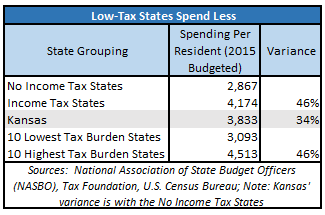Media and legislators constantly present Kansans with the false choice between paying higher taxes to bankroll more government spending or risking cuts to desired public services. But many states continue to show that it is possible to maintain both a low-tax environment and quality public services. The key to doing so lies in states controlling their spending and finding ways to provide those same or better quality services at better prices.
Income-taxing states spend 46 percent more than states without an income tax on a per resident basis. The same goes for the ten states with the highest state and local tax burdens relative to the ten states with the lowest burdens.
This comes per 2015 budgeted spending data (excluding federal spending and bond spending) from the National Association of State Budget Officers (NASBO), 2015 population estimates from the U.S. Census Bureau, and latest available state/local tax burden rankings from the Tax Foundation.
Kansas has a spending problem, not a revenue problem and spends 34 percent more per resident than states without an income tax. Legislators don’t need to make Kansas as efficient as those states to balance the budget; they simply need to reduce costs so that state government operates about 6 percent more efficiently. A November 2014 KPI poll conducted by SurveyUSA showed that 74 percent of Kansans believed this was achievable. Furthermore, only 31 percent of Kansans felt that their state government made efficient and effective use of their tax dollars already.
Those who believe government should keep more of your hard-earned money contend that states like Texas and Florida can keep taxes low simply because they are blessed with unique natural resource and tourism advantages. However, these states could still have higher tax burdens if they chose to spend more. Every state provides the same basic services (education, highways, social services, etc.), but those that do so at better prices can pass on the savings to citizens in the form of lower taxes.




